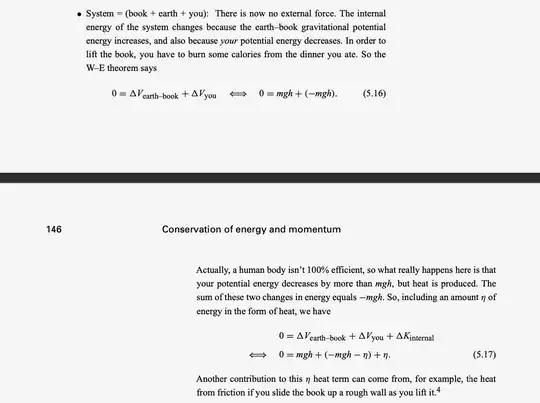I was reading morin's intro to mechanics book, and i reached the point where he was discussing work potential energy equivalence, which i find very confusing right now... basically we are analysing me lifting up a book at constant speed, and there are some cases for the system we can take...
- system = book; this is clear to me, I'm doing positive work =$mgh$ and earth is doing negative work $-mgh$
2.system = book + earth; this is also clear, I'm doing positive external work $mgh$ and the potential energy of system increases by $mgh$; all good....
But it is the third case where I have the confusion... This is what morin says...
But now my confusion is this: I know there's no net force acting, and everything is constant speed, so the net change in potential energy must be $0$... but how can we analyse the potential energy of a system piece wise; cos the potential energy is a function of the entire system, and we can't like exactly say which part of system contributes this much potential energy, cos its actually a function of the whole system... but even then, if i ignore that, ok the potential energy of earth block system is increased my $mgh$ ; which is simple to analyse, cos the work done by the internal force is $-mg \times h$; so $mgh$ is the increase in potential energy, but how can I calculate the change in my potential energy, how can i say that is $-mgh$? (like obviously i can see that the sum is zero, so it must be that, but morin used the $\iff$ (iff) sign, so it seems there is a way to say clearly that my potential energy decreased my $mgh$... i don't get how to do that at all, like if we go by the definition of $\Delta V = -$Work done by internal force; i don't see how this works at all, like maybe internal forces on me are gravity and blocks normal reaction, but how do these get you $-mgh$...
I am really trying to understand energy well, and would really appreciate any help in doing so... Thanks!